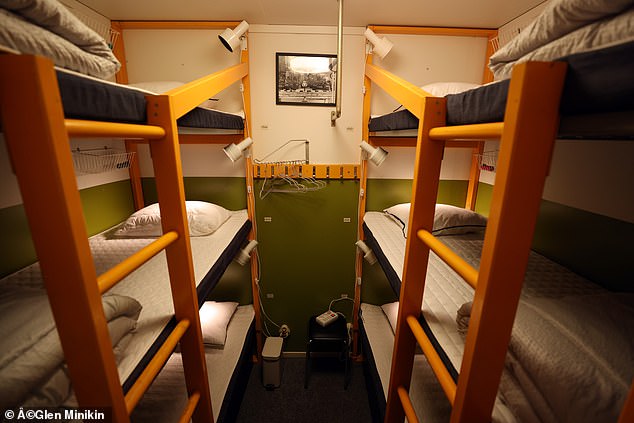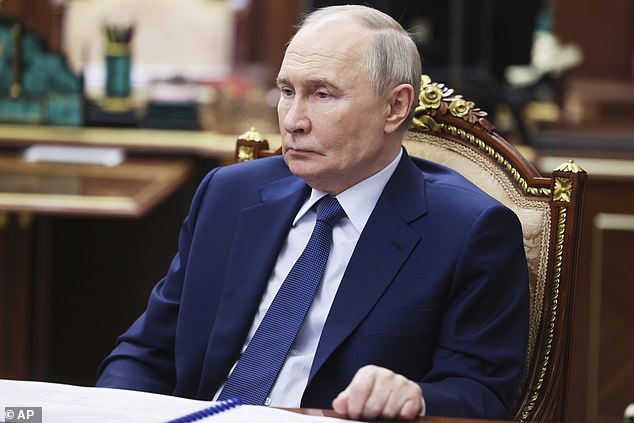The EU today announced its first ever plan to help stockpile essential goods such as food, water, fuel and medicines in case of crises, amid fears over potential war with Russia.
Brussels’ ‘stockpiling strategy’ comes as NATO warns that Russia – currently waging war on EU neighbour Ukraine – could be ready to attack the alliance within five years.
The 27-nation bloc has launched a broad readiness push to bolster its militaries and try to ensure it can defend itself by 2030.
‘The goal is very simple to make sure that essential supplies that keep our societies running, especially the ones that save lives, are always available,’ EU crisis management commissioner Hadja Lahbib said.
‘The more we prepare, the less we panic.’
The EU says the new stockpiling plan is aimed at securing the continuity of key goods during a raft of crises ‘such as major energy blackouts, natural disasters, conflicts or pandemics.’
It involves establishing a network between countries to better coordinate stocks, identifying gaps and bolstering ‘EU-level stockpiles’.

Military vehicles parade through Red Square as part of the celebrations of the 80th anniversary of Victory in the Great Patriotic War at Red Square in Moscow, Russia on May 9, 2025

A Cold War bunker in the remote Swedish village of Ljungby

Russia has already begun the mass production of KUB-M mobile nuclear shelters
Your browser does not support iframes.
The levels of crisis preparedness among EU citizens still vary markedly from country to country.
Member states, such as Finland, living under Moscow’s shadow on the EU’s eastern border, have long worked on having society ready for potential conflict.
‘Of course, if you have a 1,000 kilometres border with Russia, you will feel threatened potentially by a war,’ Lahbib said.
‘But it is normal, that in Spain, they feel that wildfires are more likely to happen. There is no one size fits all.’
Lahbib insisted that whatever the cause of a crisis – be it conflict or natural disasters – the impact on citizens such as energy blackouts can be similar.
‘People are without energy, and that’s why we need to stockpile items everywhere in the European Union,’ she said.
In March, as part of its efforts, the EU advised every household to have a three-day survival kit including water, food and flashlights ready in case of emergencies.
Advocating for the new strategy, the commission says that better integration will be facilitated by ‘highly integrated value and supply chains’ within the Single Market.
While needs may differ country to country, the EU must have a ‘comprehensive, shared analysis among all relevant stakeholders, across sectors and borders, and to coordinate efforts to prepare and respond quickly and effectively.’
Beyond war, Europe is also looking to prepare for natural disasters, human-induced disasters and health emergencies (like industrial accidents and pandemics), and hybrid threats (like cyberattacks and disinformation campaigns).

A man poses with the 2024 version of the brochure ‘If Crisis or War Comes’ in Stockholm

The ‘If Crisis or War Comes’ guide advises Swedes on how best to help their country prepare
Britain, despite having more recent memory of armed conflicts than many of its allies on the continent, has fallen behind in civil planning.
In November, the chief of the UK defence staff said that Britain simply does not have ‘some of the civil aspects or planning aspects’ that other allies have ‘as part of their traditions’.
Admiral Sir Tony Radakin told the Berlin security conference that ‘we are having those conversations to learn from our colleagues and see what might be appropriate for ourselves’.
Days prior, Sweden had announced that it would be sending out five million pamphlets to its population just north of 10 million, urging preparedness for the possibility of a lasting conflict.
Since Putin’s illegal invasion of Ukraine, Stockholm has urged Swedes to prepare mentally and logistically for a possible conflict, citing the worsening security situation.
Sweden has been in the EU since 1995 and will have a head start on new plans to ready populations, but only joined NATO in 2024, breaking nearly 200 years of neutrality in response to the perceived Russian threat on its doorstep.
Britain, part of NATO but not the EU, is starting to take measures to better prepare the civilian population for the possibility of war.
Late in June, the government published its National Security Strategy 2025, looking at ‘Security for the British People in a Dangerous World’.
‘For the first time in many years, we have to actively prepare for the possibility of the UK homeland coming under direct threat, potentially in a wartime scenario,’ the report acknowledged.

Russian President Vladimir Putin speaks with Yuri Chikhanchin, the Director of the Federal Financial Monitoring System, at the Kremlin in Moscow, Russia, Tuesday, July 8, 2025

The Danish authorities have already urged people to keep plentiful food stocks in their homes
It promised a series of new measures including strengthening borders, enhancing critical national infrastructure and promoting economic ties with the EU and the US while rebuilding a defence industrial base and protecting other sovereign capabilities.
But it also stressed the importance of building domestic resilience to future threats that ‘could cause massive disruption to our way of life’.
A new Resilience Strategy will aim to support civil society and the public sector to address risks and vulnerabilities, including launching ‘public communications to inform citizens about preparedness for risks’.
The government is investing £1bn to prepare the UK for ‘biological incidents, accidents and attacks’.